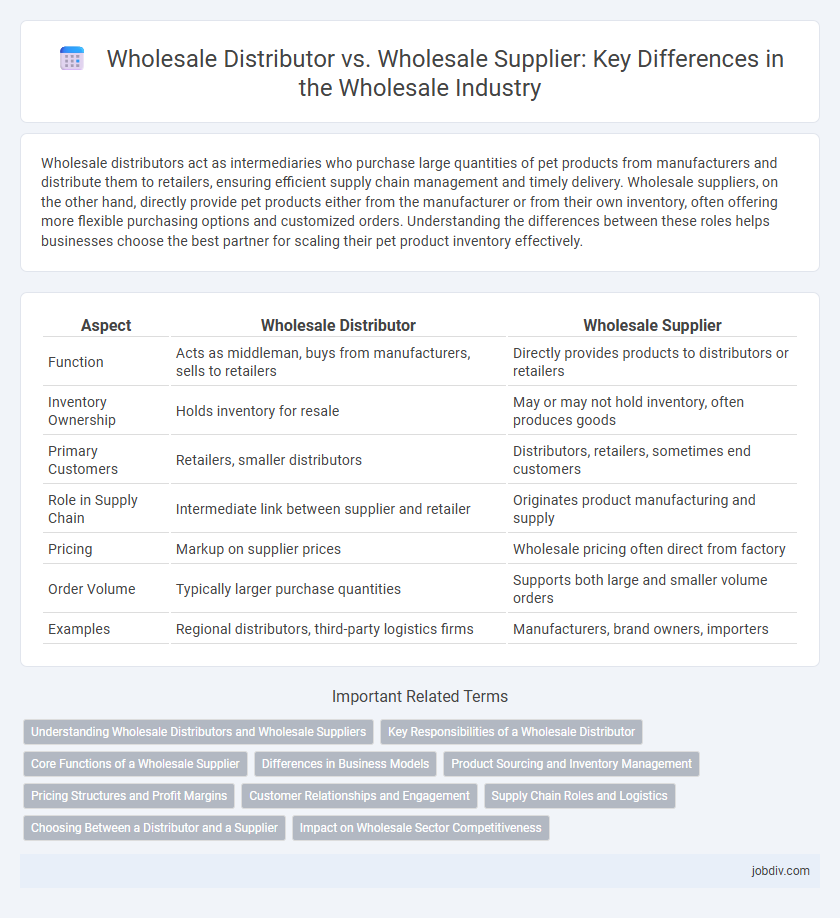Wholesale distributors act as intermediaries who purchase large quantities of pet products from manufacturers and distribute them to retailers, ensuring efficient supply chain management and timely delivery. Wholesale suppliers, on the other hand, directly provide pet products either from the manufacturer or from their own inventory, often offering more flexible purchasing options and customized orders. Understanding the differences between these roles helps businesses choose the best partner for scaling their pet product inventory effectively.
Table of Comparison
| Aspect | Wholesale Distributor | Wholesale Supplier |
|---|---|---|
| Function | Acts as middleman, buys from manufacturers, sells to retailers | Directly provides products to distributors or retailers |
| Inventory Ownership | Holds inventory for resale | May or may not hold inventory, often produces goods |
| Primary Customers | Retailers, smaller distributors | Distributors, retailers, sometimes end customers |
| Role in Supply Chain | Intermediate link between supplier and retailer | Originates product manufacturing and supply |
| Pricing | Markup on supplier prices | Wholesale pricing often direct from factory |
| Order Volume | Typically larger purchase quantities | Supports both large and smaller volume orders |
| Examples | Regional distributors, third-party logistics firms | Manufacturers, brand owners, importers |
Understanding Wholesale Distributors and Wholesale Suppliers
Wholesale distributors act as intermediaries, purchasing bulk products from manufacturers and selling them to retailers or businesses, often providing storage, logistics, and inventory management services. Wholesale suppliers, on the other hand, are typically the original manufacturers or producers who supply products directly in large quantities to distributors or retailers. Understanding the distinct roles helps streamline the supply chain, optimize inventory flow, and improve cost efficiency for businesses operating in wholesale markets.
Key Responsibilities of a Wholesale Distributor
Wholesale distributors manage large-scale procurement, inventory storage, and efficient distribution of products to retailers or businesses, ensuring timely delivery and stock availability. They handle logistics coordination, order fulfillment, and often provide credit services to streamline transactions between manufacturers and retail outlets. Maintaining strong supplier relationships and market analysis to optimize supply chain operations are critical responsibilities of wholesale distributors.
Core Functions of a Wholesale Supplier
A wholesale supplier primarily focuses on procuring goods directly from manufacturers and ensuring consistent product availability for wholesale distributors and retailers. Core functions encompass inventory management, quality control, and negotiated purchasing to offer competitive pricing. This role is crucial for maintaining supply chain efficiency and supporting large-scale distribution networks.
Differences in Business Models
Wholesale distributors purchase goods in bulk from manufacturers and maintain extensive inventory to supply retailers, focusing on logistics, warehousing, and timely delivery. Wholesale suppliers often represent manufacturers directly, providing products without holding large stock, emphasizing product availability and direct manufacturer relationships. The main difference lies in inventory ownership and business functions, with distributors managing stock and supply chain operations, while suppliers prioritize sourcing and product distribution.
Product Sourcing and Inventory Management
Wholesale distributors act as intermediaries, purchasing large quantities of products from manufacturers and maintaining extensive inventory to fulfill orders efficiently, optimizing product sourcing through established supplier networks. Wholesale suppliers often work directly with manufacturers, focusing on procuring products without holding significant inventory, enabling faster adaptation to market demands and reducing storage costs. Effective inventory management for distributors involves balancing stock levels to prevent shortages or surpluses, while suppliers rely on agile sourcing strategies to meet customer requirements promptly.
Pricing Structures and Profit Margins
Wholesale distributors typically purchase large quantities of products from manufacturers and sell them to retailers or businesses at marked-up prices, benefiting from variable pricing structures based on order volume and contract terms. Wholesale suppliers often provide products directly from the manufacturer or source, offering lower base prices but tighter profit margins due to reduced intermediaries. Pricing strategies in wholesale distribution prioritize scalability and volume discounts, while wholesale suppliers focus on competitive pricing to secure bulk contracts and maintain steady margins.
Customer Relationships and Engagement
Wholesale distributors maintain strong customer relationships through personalized service, timely order fulfillment, and ongoing communication, ensuring customer satisfaction and repeat business. Wholesale suppliers primarily focus on manufacturing and providing products in bulk, often relying on distributors or retailers to manage direct customer engagement. Effective collaboration between distributors and suppliers enhances supply chain efficiency and improves overall customer experience.
Supply Chain Roles and Logistics
Wholesale distributors act as intermediaries in the supply chain, purchasing large quantities of products from manufacturers and distributing them to retailers or businesses. Wholesale suppliers typically refer to the original manufacturers or primary producers providing goods directly to distributors or large clients. Distributors manage inventory, warehousing, and transportation logistics to ensure timely delivery, while suppliers focus on production and initial product availability within the supply chain.
Choosing Between a Distributor and a Supplier
Choosing between a wholesale distributor and a wholesale supplier depends on factors such as product range, pricing, and order flexibility. Wholesale distributors often offer a broader selection of products and faster delivery times, making them ideal for businesses requiring variety and speed. Wholesale suppliers typically provide direct access to manufacturers' goods with competitive pricing, suitable for companies seeking cost-efficiency and specific brand products.
Impact on Wholesale Sector Competitiveness
Wholesale distributors enhance sector competitiveness by efficiently managing inventory, streamlining logistics, and providing value-added services that reduce costs and improve supply chain reliability. Wholesale suppliers focus primarily on product manufacturing and supplying bulk goods, which can limit their flexibility in adapting to market demand fluctuations. The combined dynamics between distributors and suppliers drive market efficiency, pricing strategies, and innovation within the wholesale sector.
Wholesale Distributor vs Wholesale Supplier Infographic

 jobdiv.com
jobdiv.com